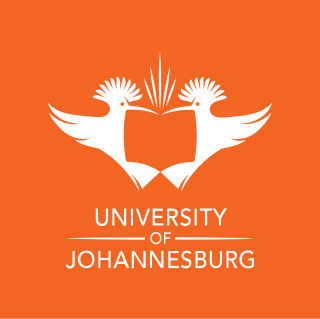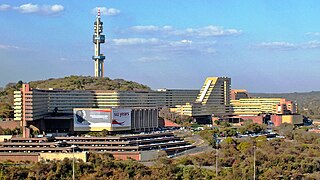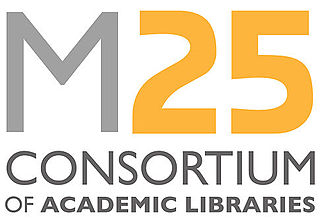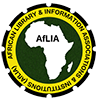Interlibrary loan is a service that enables patrons of one library to borrow physical materials and receive electronic documents that are held by another library. The service expands library patrons' access to resources beyond their local library's holdings, serving as "an integral element of collection development" for libraries.

The University of Johannesburg (UJ) is a public university located in Johannesburg, South Africa. The University of Johannesburg came into existence on 1 January 2005 as the result of a merger between the Rand Afrikaans University (RAU), the Technikon Witwatersrand (TWR) and the Soweto and East Rand campuses of Vista University. Prior to the merger, the Daveyton and Soweto campuses of the former Vista University had been incorporated into RAU. As a result of the merger of Rand Afrikaans University (RAU), it is common for alumni to refer to the university as RAU. The vice-chancellor and principal of UJ is Professor Tshilidzi Marwala who took office on 1 January 2018. Between 2005 and 2017, UJ's vice-chancellor and principal was Prof Ihron Lester Rensburg.

The Durban University of Technology (DUT) is a multi-campus university situated in KwaZulu-Natal, South Africa. It was formed in 2002 following the merger of Technikon Natal and ML Sultan Technikon and it was initially known as the Durban Institute of Technology. It has five campuses in Durban, and two in Pietermaritzburg. In 2022, approximately 31 991 students were enrolled to study at DUT. The university is one of five technical institutions on the African continent to offer Doctoral Degrees.

Electronic Information for Libraries (EIFL) works with libraries worldwide to enable access to digital information for people in developing and transition countries. They are an international not-for-profit organisation based in Vilnius with a global network of partners.
The International Coalition of Library Consortia (ICOLC) is an informal, self-organized group of library consortia from around the world; it exists for strategic and practical discussion of issues of common interest among the consortia members. The ICOLC first met informally as the Consortium of Consortia (COC) in 1997. Over time, its name was adjusted to reflect its increasingly global character.
The Council of Australian University Librarians (CAUL) is a representative leadership body for university libraries in Australia. The CAUL members represent 39 Australian University Institutions and 8 New Zealand University Institutions. Membership is restricted to library directors whose parent institutions are full members of Universities Australia.
The TexShare program is a statewide resource-sharing consortium of hundreds of member libraries in Texas, United States administered by the Texas State Library and Archives Commission (TSLAC). The TexShare program maximizes the effectiveness of library expenditures by enabling member libraries to share staff expertise, share materials electronic and print formats, pursue joint purchasing agreements on electronic databases, and encourage the cooperative development of Texas libraries statewide. TexShare is made up of Texas academic libraries, public libraries, and libraries of clinical medicine. TexShare is a member driven consortium that exists with the support and cooperation of Texas member libraries.

The University of South Africa (UNISA), known colloquially as Unisa, is the largest university system in South Africa by enrollment. It attracts a third of all higher education students in South Africa. Through various colleges and affiliates, UNISA has over 400,000 students, including international students from 130 countries worldwide, making it one of the world's mega universities and the only such university in Africa.
The Center for Research Libraries is a consortium of North American universities, colleges, and independent research libraries, based on a buy-in concept for membership of the consortia. The consortium acquires and preserves traditional and digital resources for research and teaching and makes them available to member institutions through interlibrary loan and electronic delivery. It also gathers and analyzes data pertaining to the preservation of physical and digital resources, and fosters the sharing of expertise, in order to assist member libraries in maintaining their collections. The Center for Research Libraries was founded in 1949, as the Midwest Inter-Library Center (MILC). The traditional role of CRL was as an aggregator of tangible collection materials, however this has been updated in the digital age into the CRL's current role as a facilitator of collection development, digitization, and licensing collections by individual libraries and interest groups. This transformation required CRL to adopt new funding models from partnerships with key organizations, and an updated use of current technology to support community outreach and engagement. The funding was provided by the Andrew W. Mellon Foundation, the National Science Foundation, and the IMLS.

Max Price is a former vice-chancellor and principal of the University of Cape Town (UCT) in South Africa. He succeeded Njabulo Ndebele and held this position for 10 years from 19 August 2008 until 30 June 2018.

The M25 Consortium of Academic Libraries is a collaborative organisation that works to improve library and information services within the M25 region, and more widely across the East and Southeast of England.
A library consortium is any cooperative association of libraries that coordinates resources and/or activities on behalf of its members, whether they are school, public, academic, special libraries, and/or information centers. Consortia exist on a variety of levels, e.g., local, state, regional, national or international. Libraries commonly belong to multiple consortia. The goal of a library consortium is to amplify the capabilities and effectiveness of its member libraries through collective action, including, but not limited to, print or electronic resource sharing, reductions in costs through group purchases of resources, and professional development opportunities. The “bedrock principle upon which consortia operate is that libraries can accomplish more together than alone.”
The Rhodes University Library is a library located in Makhanda, under the Makana municipality. It was initially established in 1937 in the Clock Tower building of Rhodes University College.
Open access to scholarly communication in South Africa occurs online via journals, repositories, and a variety of other tools and platforms. Compared to other African nations, open access in South Africa has grown quickly in recent years.
The South African South East Academic Libraries System, commonly known as SEALS, was conceptualized in 1998 as a regional library cooperative, and fully constituted in 1999 as a regional consortium, under the auspices of the Eastern Cape Higher Education Association (ECHEA) in South Africa.

A collective collection, shared collection, or shared print program is a joint effort by multiple academic or research libraries to house, manage, and provide access to their collective physical collections. Most shared print programs focus on collections of monographs and/or serials. Similar efforts have addressed acquisition and/or retention of microform, federal government documents, and digital collections. Shared print programs often have activities in common with national repositories and archiving programs. Discussions surrounding shared print programs in their current form have come to the forefront as a popular solution to shrinking collection budgets, rising costs of resources, and competing space needs.

The African Library and Information Associations and Institutions (AfLIA), commonly referred to as AfLIA, is an international not-for-profit organization headquartered in Accra, Ghana. The Association is registered under the laws of Ghana as an NGO. It is managed under the general guidelines of its Constitution and by-laws.The Institution is currently being led by Dr. Helena Asamoah-Hassan as the Executive Director.
The Zimbabwe Library Association (ZimLA) is an association that represents library, records, archives and information professionals in Zimbabwe. Membership for those who wish to join the association is voluntary.








